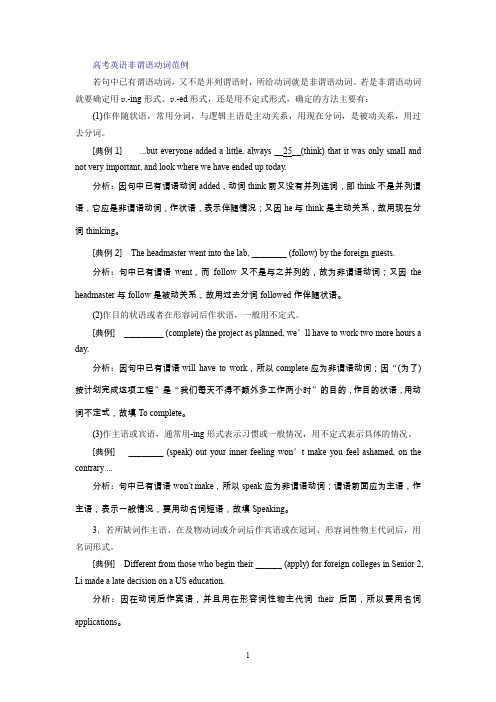高中英语写作如何写非谓语动词
- 格式:docx
- 大小:52.53 KB
- 文档页数:12

非谓语动词英语作文英文回答:As a non-native speaker, I understand that using non-finite verbs, or non-finite verb forms, can greatly enhance the language skills of a writer. These verb forms include infinitives, gerunds, and participles. They add variety and complexity to the sentence structure, making the writing more engaging and sophisticated.For example, infinitives can be used as noun phrases, adjectives, or adverbs. They can express purpose, result, or condition. By using infinitives, I can convey my intentions or desires in a concise and precise manner. For instance, instead of saying "I want to go to the park," I can say "My desire is to visit the park." This not only adds a touch of formality to my writing but also showcases my ability to use different verb forms effectively.Gerunds, on the other hand, function as nouns and canbe used as subjects, objects, or complements in a sentence. They allow me to express actions or activities in a more fluid and natural way. For instance, instead of saying "I enjoy reading books," I can say "Reading books brings me joy." This not only adds variety to my sentence structure but also demonstrates my ability to use gerunds correctly.Participles, both present and past, can be used as adjectives to describe nouns or pronouns. They add more details to my writing and create a vivid image in the reader's mind. For example, instead of saying "She is tired," I can say "She looks exhausted." This not only makes my writing more descriptive but also showcases my knowledge of using participles effectively.Overall, using non-finite verbs in my writing allows me to express myself more effectively and showcase my language skills. It adds variety, complexity, and sophistication to my sentences, making them more engaging and interesting to the reader.中文回答:作为非母语者,我理解使用非谓语动词可以大大提升写作的语言技巧。

高中英语语法非谓语动词讲解非谓语动词是英语中的一种特殊动词形式,它们可以在句子中作名词、形容词或副词的作用。
高中英语语法中,非谓语动词主要分为不定式、动名词和分词三种形式。
1. 不定式不定式由“to + 动词原形”构成,如:to go、to study。
不定式在句子中可以作主语、宾语、表语、定语或状语。
1.1 作主语不定式作主语时,句子用“it + be + 不定式”结构,如:It is important to learn English well.1.2 作宾语不定式作宾语时,常跟在及物动词后面,如:I want to play soccer.1.3 作表语1.4 作定语不定式作定语时,修饰名词或代词,如:a book to read.1.5 作状语不定式作状语时,表示目的、结果、原因等,如:He came here to see his friend.2. 动名词动名词是由动词加-ing构成的名词,如:playing、studying。
动名词在句子中可以作主语、宾语、表语、定语或状语。
2.1 作主语动名词作主语时,常用单数形式,如:Swimming is good for health.2.2 作宾语动名词作宾语时,常跟在及物动词后面,如:I enjoy playing basketball.2.3 作表语动名词作表语时,句子用“主语 + be + 动名词”结构,如:His hobby is swimming.2.4 作定语2.5 作状语动名词作状语时,表示方式、时间、原因等,如:He made money by working hard.3. 分词分词是由动词的变化形式构成的形容词,常分为现在分词和过去分词两种形式。
分词在句子中可以作定语、表语或状语。
3.1 现在分词作定语现在分词作定语时,修饰名词或代词,如:a crying baby.3.2 过去分词作定语过去分词作定语时,修饰名词或代词,如:a broken window.3.3 分词作表语分词作表语时,句子用“主语 + be + 分词”结构,如:He is tired.3.4 分词作状语分词作状语时,表示时间、原因、条件等,如:Walking slowly, he reached the destination.以上是高中英语语法非谓语动词的讲解,希望对你有所帮助。


非谓语动词动词在句子中除了充当谓语外,还可以起名词、形容词或副词的作用,在句子中充当主语、宾语、表语、补语、定语和状语。
这就是动词的非谓语形式。
当句子中需要用某种动作作主语、宾语或作某种修饰、说明的成分时,就要使用这种形式。
动词的非谓语形式有三种:(1)动词不定式:to study (to + 动词原形)(2)分词:studying (现在分词)、studied (过去分词)(3)动名词:studying (形式与现在分词相同)动词非谓语形式仍具有动词的一般特征,可以带有宾语、状语等构成短语。
动词非谓语形式有以下几种形式变化(以write为例):一、动词不定式其形式是“to+动词原形”。
to是不定式符号,无词义。
其否定式是在to前面加上not, never等否定词。
不定式可以有自己的逻辑主语,由for引出,加在不定式短语前面。
如果不定式的逻辑主语是表示不定式动作的承受者,则不定式用被动语态。
所谓逻辑主语,就是指非谓语动词等动作的执行者。
由于非谓语动词等带有动词的特征,但又不是谓语动词,所以这个动作的执行者就不能称为主语,而在逻辑上又是这个动作的执行者,所以就称为逻辑主语。
如果不定式逻辑上的主语是这个不定式所表示的动作的承受者,这个不定式一般要用被动语态。
疑问词(who, whom, whose, what, which, when, where, why, how还包括whether)等后面加不定式构成不定式短语,可做主语,表语,宾语等。
(一)作主语。
在不定式短语作主语的句子中,往往用it 作形式主语,而不把不定式短语放在句子的后面。
如:To die like that is a terrible thing.=It is a terrible thing to die like that.象那样死去是一件可怕的事。
(it 作形式主语,把真正的主语to die like that放在后面)To know oneself is difficult.=It’s difficult to know oneself.有自知之明不容易。

高考非谓语动词用法在高考英语中,非谓语动词一直是重点和难点,也是许多同学容易出错和混淆的知识点。
非谓语动词包括动词不定式、动名词和分词(现在分词和过去分词),它们在句子中不充当谓语,却有着丰富的用法和重要的语法功能。
首先,我们来了解一下动词不定式。
动词不定式的基本形式是“to+动词原形”,它具有名词、形容词和副词的特征。
作主语时,为了避免句子头重脚轻,常用 it 作形式主语,而把真正的主语——动词不定式后置。
例如:“It is important to learn English well”在这里,“to learn English well”才是真正的主语,表示“学好英语”这件事很重要。
作宾语时,常见的动词有 want, hope, decide 等。
比如:“I want to go shopping this weekend” 这里的“to go shopping”就是宾语,表示“去购物”这个意愿。
作定语时,常常表示将来的动作。
像“The best way to solve the problem is to work hard” 中“to solve the problem”修饰“way”,意思是“解决问题的最好方法”。
作状语时,可以表示目的、结果等。
比如“He got up early to catch the first bus” 这里“to catch the first bus”表示目的,即“为了赶上第一班公交车”。
接下来,动名词也是高考中的常客。
动名词由动词+ ing 形式构成,具有名词的特征。
作主语时,谓语动词要用单数形式。
例如:“Swimming is good for health” 这里“swimming”表示“游泳”这个动作。
作宾语时,常见的动词有 enjoy, finish, practice 等。
比如:“I enjoy reading books in my spare time” 其中“reading books”就是宾语。

高考英语非谓语动词范例若句中已有谓语动词,又不是并列谓语时,所给动词就是非谓语动词。
若是非谓语动词就要确定用v.-ing形式、v.-ed形式,还是用不定式形式,确定的方法主要有:(1)作伴随状语,常用分词,与逻辑主语是主动关系,用现在分词,是被动关系,用过去分词。
[典例1]...but everyone added a little, always __25__(think) that it was only small and not very important, and look where we have ended up today.分析:因句中已有谓语动词added,动词think前又没有并列连词,即think不是并列谓语,它应是非谓语动词,作状语,表示伴随情况;又因he与think是主动关系,故用现在分词thinking。
[典例2]The headmaster went into the lab, ________ (follow) by the foreign guests.分析:句中已有谓语went,而follow又不是与之并列的,故为非谓语动词;又因the headmaster与follow是被动关系,故用过去分词followed作伴随状语。
(2)作目的状语或者在形容词后作状语,一般用不定式。
[典例]_________ (complete) the project as planned, we’ll have to work two more hours a day.分析:因句中已有谓语will have to work,所以complete应为非谓语动词;因“(为了)按计划完成这项工程”是“我们每天不得不额外多工作两小时”的目的,作目的状语,用动词不定式,故填To complete。
(3)作主语或宾语,通常用-ing形式表示习惯或一般情况,用不定式表示具体的情况。
[典例]________ (speak) out your inner feeling won’t make you feel ashamed, on the contrary ...分析:句中已有谓语won’t make,所以speak应为非谓语动词;谓语前面应为主语,作主语,表示一般情况,要用动名词短语,故填Speaking。
非谓语动词英语作文英文回答:Non-finite verbs, which include infinitives, participles, and gerunds, are verb forms that do not have a tense and cannot function as the main verb of a sentence. They are used to express various grammatical functions, such as:Infinitives: To express purpose, potential, or obligation (e.g., "I want to go to the beach."). They can also function as nouns or modifiers.Participles: To indicate ongoing or completed actions (e.g., "The singing birds filled the air with melody." "The homework, completed at last, brought a sigh of relief."). They can function as adjectives or adverbs.Gerunds: To name an action or process as a noun (e.g., "Reading is my favorite pastime." "Walking the dog is adaily routine."). They can be used as subjects, objects, or complements.Non-finite verbs are essential in English grammar, adding nuance and flexibility to sentences. By understanding their functions and how to use them effectively, writers can enhance their writing style and convey complex ideas clearly.中文回答:非谓语动词。
非谓语动词非谓语动词(一)——动词不定式动词不定式、分词(此刻分词,过去分词)和动名词统称为非谓语动词。
现代英语将此刻分词和动名词合为一大类叫作 v + ing 形式。
这些动词的形式不可以在句中独自作谓语用,因此没有语法主语。
但能够有逻辑主语。
因为没有语法主语,也就不受人称和数的限制,因为不是谓语,也就没有时态和语态,但这些词还能表示动作和状态,所以仍有表示与其余动词相对时间关系的形式。
因为与其余词有逻辑上的主谓关系,所以也有表示主、被动的形式,同时也有自己的宾语和状语,一同组成非谓语动词的短语(动词不定式短语,分词短语,动名词短语)。
动词不定式、过去分词及 v-ing 形式在句中均不可以作谓语用,所以叫做非谓语动词。
(一)动词不定式:动词不定式由“to+动词原形”组成,如: to study, to play ,动词不定式固然不可以作谓语动词用,但仍留着动词的特点,它能够带有所需要的宾语或状语而组成动词不定式短语,如:to study hard,to play table tennis 。
1、动词不定式的形式变化:动词不定式有以下时态和语态的形式变化。
不定式一般式达成式进行式达成进行式主动to build to have built to be building to have been building被动to be build to have been build2、动词不定式的基本用法:动词不定式能起名词、形容词和副词的作用,可在句中作主语、表语、宾语补足语、定语和状语用,如:(1)作主语: To help each other is good. (动词不定式作主语时,一般可用 it 作形式主语,而将作主语的动词不定式置于句末,如: It is good to help each other.(2)作表语: My job is to drive them to the power station every day.动词不定式在系动词be以后作表语,与表示未来时的 be +动词不定式构造有所差别,如: Our plan is to set up another middle school for the peasantschildren. 我们的计划是给农民子弟再建立一所中学。
非谓语动词讲解高中非谓语动词是指在句子中作动词的用法,而不是表示谓语动作或状态的主要成分。
非谓语动词包括动词不定式、动名词和分词。
在高中英语中,非谓语动词经常用于句子的修饰、独立主语和补语等的结构。
下面将对非谓语动词进行详细的讲解和提供相关的参考内容。
一、动词不定式(infinitive)动词不定式是动词的一种非谓语形式,常用于句子中作主语、表语、宾语、状语和补足语等。
动词不定式的基本形式是“to+ 动词原形”,它具有名词、形容词和副词的特点。
1. 作主语- It's difficult to learn a new language.(学习一门新语言是困难的。
)2. 作宾语- I want to go to the movies.(我想去看电影。
)3. 作表语- Her dream is to become a doctor.(她的梦想是成为一名医生。
)4. 作状语- She studies hard to improve her grades.(她努力学习以提高自己的成绩。
)5. 作补语- He made me laugh.(他让我笑了。
)二、动名词(gerund)动名词是动词的一种非谓语形式,常用于句子中作主语、宾语、表语和状语等。
动名词的基本形式是动词+ing形式,它具有名词的特点,可以在句子中起到名词的作用。
1. 作主语- Swimming is good exercise.(游泳是很好的运动。
)2. 作宾语- I enjoy reading novels.(我喜欢读小说。
)3. 作表语- His favorite activity is playing basketball.(他最喜欢的活动是打篮球。
)4. 作状语- She learned English by watching American movies.(她通过看美国电影学习英语。
)三、分词(participle)分词是动词的一种非谓语形式,常用于句子中作定语、状语和表语等。
高中英语非谓语动词用法小结非谓语动词是指不受主语时态和数的限制,不能单独作谓语,而要与另一个动词或名词搭配使用的动词形式。
在英语中,非谓语动词有动名词、不定式和分词三种形式。
非谓语动词使用广泛,灵活多样,能够丰富语言表达,增加语言的表现力。
掌握好非谓语动词的用法对于提高英语语言能力非常重要。
下面将对高中英语非谓语动词的用法进行小结。
一、动名词1. 动名词的构成:动词的-ing形式。
2. 动名词的用法:(1) 作主语:Walking is good for health.(散步对健康有益。
)(2) 作宾语:I enjoy swimming in the sea.(我喜欢在海里游泳。
)(3) 作介词宾语:He is good at playing basketball.(他擅长打篮球。
)(4) 作定语:I like watching movies.(我喜欢看电影。
)(5) 作表语:Her hobby is dancing.(她的爱好是跳舞。
)(6) 作宾语补语:I heard him singing in the room.(我听见他在房间里唱歌。
)3. 特殊用法:(1) 动名词作主语时,谓语动词用单数形式。
如:Swimming is my favorite sport.(2) 动名词作宾语时,如果动词本身已经是-ing形式,则动名词用于表示被动,否则用于表示主动。
例如:二、不定式1. 不定式的构成:to + 动词原形。
3. 特殊用法:(1) 不定式的否定形式是在to后加not,构成形式如:to not do或not to do。
例如:She decided not to go there.(2) 不定式短语往往表示目的,可以用在so as to或in order to引导的从句中。
例如:He got up early in order to catch the first bus.We worked hard so as to finish the task on time.三、分词掌握好非谓语动词的用法对于学习英语语言至关重要。
学科教师辅导教案教学内容如何写好非谓语动词众所周知,作文中出现过多的简单句会让人觉得单调乏味,句子与句子之间的关系显得松散;而文章中过多地出现复合句又显得累赘,读起来费劲。
恰当地运用非谓语动词对简单句和复合句进行转换,不仅句型多样,句子活泼,而且读起来结构紧凑,言简意明。
一、运用非谓语动词转换简单句1.我为那事感到非常遗憾,开始考虑做些什么来帮一下。
I feel quite sorry for that.I begin to think about what to do to help.→ Feeling quite sorry for that,I begin to think about what to do to help.(2013陕西卷满分作文· )(现在分词作状语) 2.另一方面,我将帮着建立英语角,提供给我们学生一个练习英语口语的平台。
On the Ⅱ. 同步讲解other hand,I will help set up the English corner.I will provide us students a platform to practice our oral English.→ On the other hand,I will help set up the English corner,providing us students a platform to practice our oral English.(2013 天津·卷满分作文)(现在分词作状语)3.这儿的人都喜欢汤姆写的那本小说。
All the people here like the novel.It is written by Tom.→ All the people here like the novel written by Tom.(过去分词作定语) 4.我们应该多讲英语。
我们认为这是很重要的。
We should speak more English.We think it is very important.→ We think it very important to speak more English.(it作形式宾语,不定式作真正宾语) 5.我们应该如何提高我们的英语口语水平?这是个问题。
How should we improve our spoken English?It is a question.→ How to improve our spoken English is a question.不(定式短语作主语)→ The question is how to improve our spoken English.不(定式短语作表语) [练一练] 运用非谓语动词转换简单句1.We were touched by the teacher ' s words.We decided to work hard.Touched_by_the_teacher _'w s ords,we_decided_to_work_hard.2.I didn ' t receive her letter.I had to write again. Not_having_received_her_letter,I_had_to_write_again.3.The boy came to school late again.This made the teacher very angry.The_boy'_s coming_to_school_late_again_made_the_teacher_very_angry.4.The boys were making the most of time.They wanted to finish the work earlier.The_boys_were_making_the_most_of_time_(so_as)_to_finish_the_work_earlier. 5.I saw an oldgranny.She lay on the ground.I went over to help her. Seeing_an_old_granny_lying_on_the_ground,I_went_over_to_help_her.二、运用非谓语动词转换复合句1.惊诧于他们的熟练程度,我决心要像他们一样好。
Because I was amazed at how skillful they wer,e I determined to be just as good.分词作状语)2.看到一辆车朝她而来,我伸出手把她拉了回来。
When I saw a car running towards he,r I reached my hand out and pulled her back.→ Seeing a car running towards her,I reached my hand out and pulled her back.(2013安·徽卷满分作文)(现在分词作状语)3.练习了接近两个月后,我们强烈渴望获得一场胜利。
After we had practiced playing basketball for almost two months,we strongly desired to be the winner.→ Having practiced playing basketball for almost two months ,we strongly desired to be the winner.(2013 湖·南卷满分作文)(现在分词作状语)4.这里曾有一家化肥厂,位于城市的南边。
它每天释放出大量有毒气体,污染环境。
There was a large factory,which produced fertilizer.Every day it gave out a lot of poisonous gas,which polluted the environment.→ There was a large factory,which produced fertilizer.Every day it gave out a lot of poisonous gas,polluting the environment.简析:“原句”中分别由which 引导两个定语从句,重复且单调,将第二个定语从句转换为现在分词短语作状语后,不仅表达多样,而且言简意明。
5.由于老师的帮助,我的英语进步很大。
因为我的英语进步很大,我确信我能考上更好的大学。
Because my teacher helps me,my English has greatly improved.Because my English has greatly improved,I 'm sure I will go to a better university.→With my teacher helping me,my English has greatly improved.Because my English has greatly improved,I 'm sure I will go to a better university.简析:“原句”两处重复出现由because引导的从句,读起来很别扭。
换用“with+现在分词的复合结构”后,读起来给人的感觉大不一样。
[练一练] 运用非谓语动词转换复合句1.As soon as they saw a few people still in the burning house,they rushed into it to save them without hesitation.→ On_seeing_a_few_people_still_in_the_burning_house,they rushed into it to save them without→ We think it is necessary that middle school students should learn a foreign language and we also thinkit_possible_for_them_to_master_one.3.I took part in the meeting ,which was held in Beijing last Friday.It was very instructive ,which was hosted by a manager who came to our company yesterday.→ I took part in the meeting held_in_Beijing last Friday.It was very instructive ,which was hosted by a manager coming_to_our_company yesterday.4.Mother went to work in a hurry,and she didn ' t have breakfast.She was as busy as a bee these days came back home very late.→ Mother went to work in a hurry without_having_breakfast.She was as busy as a bee these days,coming_back_home_very_late.三、运用非谓语动词转换短文(根据一般表达写出该短文的高级表达)北京市有大量的出租车司机,他们每天全心全意地为乘客服务,为北京市的交通发挥着重要作用。
他们起早贪黑,赚钱养家糊口。
有一次,我下车时不小心把手机忘在了车上,但当我和司机同志联系上之后,他立即开车把手机送到了我家门口,让我感动不已。
一般表达:There are a large number of taxi drivers in Beijing.They serve passengers heart and soul.They play an important part in the traffic of Beijing.They make some money.They work from dawn till night.One day ,I left my cellphone in the taxi I took.I got in touch with the driver.He drove to my home and gave it back to me.I was very excited.高级表达:There are a large number of taxi drivers in Beijing ,serving passengersh eart and soul and playing an important part in the traffic of Beijing.In order to make some money to support their families ,they work from dawn till night.One day,I got out of the taxi in a hurry with my cellphone left in the taxi I took.On hearing what had happened,the taxi driver drove to my home as fast as possible and gave the cellphone back to me.Seeing my cellphone again,I was too excited to say a word.[练一练] 运用非谓语动词转换短文大城市里高楼大厦林立,房价越来越高。